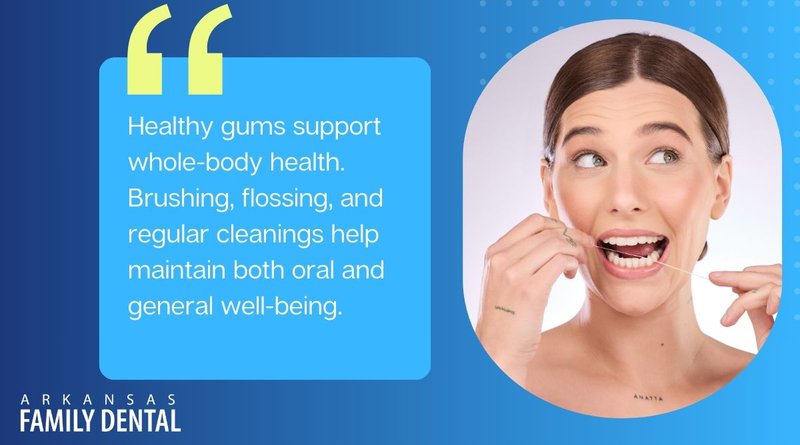Gum Disease Prevention: Are You Missing Early Signs?

April 22, 2025
Bleeding gums, bad breath, or swelling may seem minor, but they could be warning signs. Gum disease often starts silently, and by the time symptoms worsen, damage may already be happening. Ignoring early signs can lead to pain, infection, and even tooth loss. The good news? You can catch it early with simple habits and regular checkups, and gum disease prevention can often be achieved with simple steps. Are you overlooking the warning signs?
Key Takeaways:
- Early Signs of Gum Disease: Bleeding, swollen, red gums; persistent bad breath; gum recession; pain while chewing.
- Causes: Plaque buildup, smoking, diabetes, stress.
- Gum Disease Prevention: Brush with a soft-bristle toothbrush twice daily, floss once daily, and use antibacterial mouthwash.
- Diet & Hydration: Eat vitamin-rich foods (C, D, calcium, zinc); avoid sugar; drink water to remove bacteria.
- Professional Care: Get dental cleanings every six months to remove plaque and prevent infections.
- Natural Remedies: Oil pulling, saltwater rinses, and antibacterial herbs may help but should not replace professional care.
- Risk Factors: Smoking, stress, diabetes, and hormonal changes can make gum disease worse.
- Health Risks: Untreated gum disease may lead to heart disease, diabetes complications, respiratory infections, and tooth loss.

Early Signs of Gum Disease
Bleeding gums are often one of the first signs. If you see pink in the sink after brushing or flossing, your gums may be inflamed. Healthy gums should not bleed during routine cleaning. This early stage, gingivitis, happens when plaque builds up along the gumline. If not addressed, it can progress to periodontitis, causing gum recession and bone loss.
Swollen or red gums may also indicate a problem. Gums that look puffy, feel tender, or appear darker than normal may be reacting to bacteria in plaque. Inflammation is the body's response to infection, but prolonged swelling can weaken gum tissue.
Bad breath that doesn’t go away could be another indication of infection. Bacteria trapped under the gums release toxins that cause an unpleasant odor. If brushing, flossing, and mouthwash doesn’t help, bacteria may be spreading unchecked under the gumline.
Gum recession is another warning sign. If your teeth look longer than before or small gaps are forming near the roots, your gums may be pulling away. This allows bacteria to move deeper, increasing the risk of tooth loss.
Pain while chewing could signal gum disease, especially if teeth feel sensitive or loose. As the disease progresses, it weakens the bone that holds teeth in place, causing them to shift.
Ignoring these symptoms of unhealthy gums can lead to serious dental issues. Regular checkups can catch gum disease early, preventing permanent damage. For more information, visit the National Institute of Dental and Craniofacial Research.
The Main Causes of Gum Infections
Gum infections start when plaque, a sticky layer of bacteria, builds up on teeth. If not removed, plaque hardens into tartar, which causes inflammation in the gums. This leads to gingivitis, the first stage of periodontal disease stages. If untreated, the infection spreads deeper, damaging gum tissue and bone.
Plaque Buildup
Plaque buildup traps bacteria against the gums, releasing toxins that irritate and inflame the tissue. Consequently, without proper brushing and flossing, plaque hardens into tartar, which only a dentist can remove. As a result, tartar allows bacteria to multiply, leading to infection and gum recession.
Smoking
Smoking is one of the leading causes of gum infections. It weakens the immune system, making it harder for gums to fight infections. Smokers also have reduced blood flow to the gums, slowing healing and increasing the risk of severe gum disease. Even with treatment, smokers heal more slowly and are at a higher risk of tooth loss.
Diabetes and Stress
High blood sugar enables bacteria to thrive in the mouth, making it harder for the body to fight infections. Inflammation in gums is also more common in people with uncontrolled diabetes.
Stress can also contribute. It weakens the body's ability to fight infections, allowing plaque to trigger gum disease more easily. People under stress may also neglect oral hygiene, skip dental visits, or grind their teeth, all of which harm gum health.
If left unchecked, gum infections can cause pain, tooth loss, and may even affect overall health. Good oral hygiene and quitting smoking lower the risk. Regular checkups help detect problems early. Learn more about early gum care here.
Oral Hygiene and Gum Disease Prevention
Brushing, flossing, and using the right products help keep gums healthy. A good oral hygiene routine prevents gum disease by removing plaque before it turns into tartar.
Best Brushing Techniques
Use a soft-bristle toothbrush at a 45-degree angle. Move the brush in small circles along the gumline for at least two minutes, twice daily. Clean the front, back, and chewing surfaces of each tooth, and don’t forget the tongue.
Flossing Frequency
Floss once a day to remove plaque between teeth. Slide the floss gently up and down, forming a C-shape around each tooth. If flossing is difficult, try interdental brushes or water flossers.
Antibacterial Mouthwash
An antibacterial mouthwash kills bacteria that brushing and flossing might miss, which is great for gum disease prevention. It also helps reduce plaque and inflammation. Choosing one with fluoride offers added protection.
Best Toothpaste for Gums
Use a fluoride toothpaste with antibacterial agents. Some contain stannous fluoride, which helps reduce gum inflammation. Avoid toothpaste with harsh abrasives that could irritate gums.
Professional Dental Cleanings and Gum Disease Prevention
Regular cleanings remove plaque and tartar that brushing alone cannot. Only a dental professional can remove hardened tartar.
Preventing Gum Infections
Plaque contains bacteria that irritate the gums. Left untreated, gingivitis can also progress to periodontitis, leading to bone loss. Professional cleanings help stop this progression.
Dentist Visits
Most people should get a cleaning every six months. Those with a history of gum disease may need more frequent visits.
Removing Tartar
Tartar creates a rough surface where bacteria thrive, increasing the risk of infection. Once it forms, only a professional can remove it.
Skipping cleanings raises the risk of gum disease. Visits help prevent plaque buildup and keep gums healthy.
Natural Remedies for Gum Disease Prevention
Natural remedies may support gum health but do not replace professional care. Regular brushing, flossing, and checkups remain the best prevention.
Oil Pulling
Swishing oil (such as coconut or sesame) in the mouth for 10–20 minutes may reduce bacteria and improve breath. However, it does not replace brushing and flossing.
Herbs and Natural Rinses
Aloe vera, tea tree oil, and echinacea have antibacterial properties that may soothe gums. Saltwater rinses can also reduce swelling, and green tea extract may lower inflammation.
Risks With Home Remedies
While natural remedies can ultimately be helpful for gum disease prevention, some may cause irritation or allergic reactions. Essential oils should always be diluted. Too much salt can dry out the mouth. If irritation occurs, stop use and consult a dentist.
Untreated Gum Disease
Gum disease can start with mild symptoms but lead to serious health issues, which makes gum disease prevention and treatment incredibly important.
Heart Health
Studies suggest that bacteria from infected gums can enter the bloodstream, thereby increasing inflammation in blood vessels. Consequently, this may raise the risk of heart attacks and strokes.
The Consequences of Untreated Gum Disease
Gingivitis can develop into periodontitis, causing bone loss and tooth instability. The infections can also impact diabetes management and respiratory health.
Overall Well-Being
Poor gum health can complicate conditions like diabetes and pregnancy. Moreover, research suggests ties between gum disease and Alzheimer's.
Therefore, healthy gums support whole-body health. Brushing, flossing, and regular cleanings help maintain both oral and general well-being.
Simple Steps to Prevent Gum Disease
Gum disease can lead to discomfort, bleeding gums, and even tooth loss if left untreated. The good news? It’s preventable! Brushing and flossing daily, eating a balanced diet, and scheduling regular dental cleanings can help keep your gums healthy and strong. At Arkansas Family Dental, we provide expert care to support your oral health. Schedule an appointment today to take proactive steps in preventing gum disease!
Connect With
Call (501) 232-6273 or request an appointment online to set up your first visit. We’ll be in touch soon.
